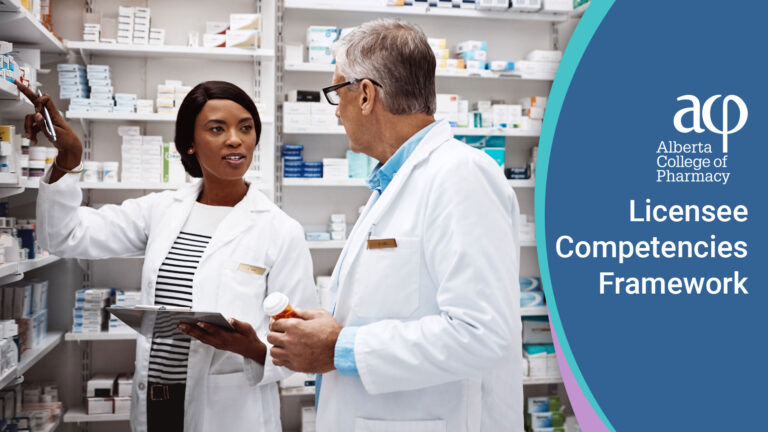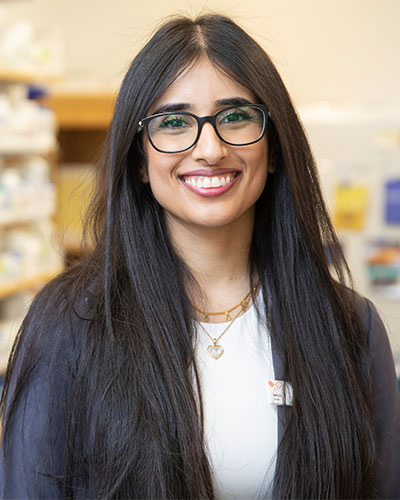

One of the six competencies important for licensees identified in ACP’s Licensee Competencies Framework is to value diversity, equity, and inclusion.
Harjyot (Jyoti) Palak is the licensee at a community pharmacy in Edmonton that has created a safe and welcoming space. Jyoti shared her thoughts about creating a positive workplace culture, being culturally sensitive towards patients and team members, and applying these concepts as part of providing person-centred care.
Why do you think it’s important to have a positive workplace culture among members of your pharmacy team?
“I think everyone can understand what it’s like to not have a positive workplace culture. I think if you go into a space that has a positive workplace culture, you’ll feel better about actually sharing your ideas if you feel like your opinions are being valued, you as a person are being respected in your identity, and your diverse perspectives are being respected. We make sure that we’re being inclusive, supportive, and respectful. At our pharmacy, we have a culture of calling each other out lovingly. What I mean by that is if we feel like something is not appropriate, someone’s misgendering someone, whatever the situation may be, we will correct them in that moment. And it’s because we have such a positive workplace culture that we are able to do that. People don’t feel like it’s a punitive thing. It’s not coming from a negative place. It’s coming from a place of trying to make sure that we’re all growing together.”
Are there any other initiatives that you’ve incorporated here to make sure you’ve got that positive culture?
“The way that we interact with patients, introducing ourselves with our pronouns, wearing our pronouns on our nametags, having visible signage in our pharmacy, the way that we document patient information, our consent forms are inclusive, making sure that we have a space where people can indicate their sex assigned at birth and their gender if they want to, having a space where they can indicate their pronouns if they want to. Just little things like that.”
What does it mean for a pharmacy professional to be culturally sensitive?
“The way that I view cultural sensitivity is considering all the beliefs and values and respecting all the attitudes that people have towards their health care. Some groups are linked through language, through race, through nations, but it’s important that we’re respecting those beliefs, values, and traditions as well, and not alienating folks further. It’s important that we take the time to learn and make sure that we’re competent. We need to understand when someone says that they want to do a smudging ceremony, or they’re fasting and they need to get off of all their medications, or it’s Ramadan and someone tells you that they can’t take a certain medication a certain time of day because they’re fasting. It’s on us to learn, especially as licensees. I think it’s a great thing to find resources for people or places where you can refer people to—how to connect people with care. If you’re being culturally sensitive, I think a person is more likely to disclose information about their health. They’re more likely to have a trusting relationship with you.”
What are the risks if we’re not culturally sensitive?
“If you’re not culturally sensitive, you may alienate this person further. This may be another negative experience that they have with the healthcare system. And that’s not because we as pharmacy professionals are hoping that they have a negative experience—it’s not that we have a malicious intent. But if we aren’t doing the work to be culturally sensitive, we may make them feel like they can’t share what they’re looking to do if they’re looking to fast, if they have a spiritual ceremony where they need to get off all their medications, that we aren’t helping them do that appropriately. They’re not going to come and seek that information from us in the future. They’re just going to figure out how to do it themselves and that might not be safe.”
Do you provide orientation for new team members that sets the tone for person-centred care?
“When we’re training new staff or new students coming in, the first thing I ask them is, ‘What pronouns do you use?’ They soon understand that that’s a very common question in our pharmacy and it’s a normal question to be asking.
When you grab a prescription, you ask the patient, ‘Is this prescription for you?’ If they say yes, you ask, ‘What name do you go by?’ And then you ask them what their pronouns are, what their allergies are, what other medications they are on. Make sure you do your clinical assessment as well, but it’s just part of our process.”
What if a regulated member makes an honest effort, but makes a mistake?
“There’s going to be a day where you misgender someone. But it’s also important to learn how to correct those mistakes and understand the harm that causes. Understand that there is a way to apologize, recognize what happened, and then move on. Then, continue to try to do better.”




